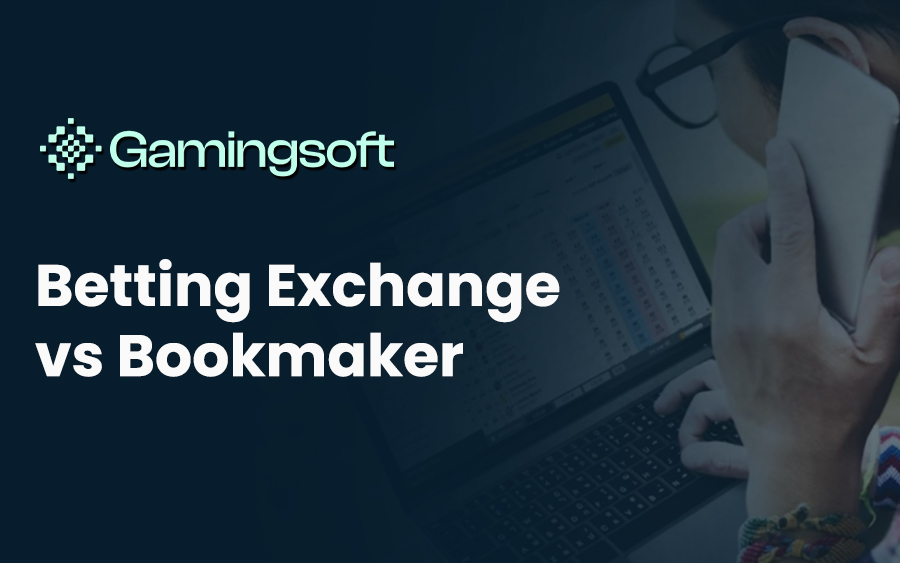The iGaming industry has seen countless innovations over the years—from online slots with cinematic graphics to AI-driven CRM tools. Yet, when it comes to sports betting, two models dominate the conversation: the traditional bookmaker and the betting exchange.
At first glance, both may seem similar: players bet on outcomes and either win or lose. But the mechanics, profit models, and user experience are fundamentally different. Whether you’re a bettor exploring new ways to wager or an operator considering platform expansion, understanding Betting Exchange vs Bookmaker is crucial.
In this article, we’ll break down the differences, advantages, and challenges of both systems—backed by real figures and industry insights.
What is a Bookmaker?
A bookmaker (or sportsbook) sets odds and accepts bets directly from players. The bookmaker is always the counterparty: when you win, the bookmaker pays you; when you lose, the bookmaker keeps your stake.
- Revenue Model: Bookmakers build a margin into their odds (called the “overround”), ensuring long-term profitability.
- Example: If the true probability of Team A winning is 50%, the fair odds should be 2.0. But a bookmaker might set them at 1.91 to guarantee a margin.
According to a report by Statista, the global sports betting market was valued at $242 billion in 2022, much of it generated by traditional bookmakers.
What is a Betting Exchange?
A betting exchange eliminates the bookmaker entirely. Instead, players bet against each other, with the platform only acting as a facilitator.
- Players can back (bet for) or lay (bet against) outcomes.
- The exchange charges a commission on net winnings, usually around 2–5%.
- Odds are determined by market demand and supply, much like a stock exchange.
The largest global exchange, Betfair, processes over 20 million transactions daily—more than all European stock exchanges combined.
Key Differences: Betting Exchange vs Bookmaker
| Aspect | Bookmaker | Betting Exchange |
| Role of Operator | Counterparty to bets | Market facilitator |
| Odds Setting | Bookmaker sets odds, adds margin | Odds set by players (supply & demand) |
| Revenue Model | Margin built into odds | Commission on winnings |
| Player Advantage | Limited odds value | Potentially better odds, option to lay bets |
| Liquidity Requirement | Not required (bookmaker covers all bets) | Essential for smooth betting markets |
| Transparency | Lower (odds can favor the house) | Higher (peer-to-peer pricing) |
Advantages of a Bookmaker
- Simplicity – Players only need to “back” a team or outcome. No advanced knowledge required.
- Familiarity – The majority of global sports betting is still bookmaker-driven.
- Guaranteed Liquidity – Bookmakers always accept bets, regardless of market demand.
- Promotions & Bonuses – Free bets, risk-free bets, and cashback are heavily used by bookmakers.
Advantages of a Betting Exchange
- Better Odds for Players – No built-in margin; players often get higher returns.
- Lay Betting Option – Bettors can profit by betting against outcomes (e.g., betting a team won’t win).
- Transparency – Market odds are determined by player activity, not by a “house edge.”
- Trading Opportunities – Skilled players can trade odds mid-game like stocks, locking in profits regardless of outcome.
Challenges for Operators
- For Bookmakers:
- Need to manage risk exposure if too much money is placed on one side.
- Constant requirement to adjust odds in real time.
- For Betting Exchanges:
- Liquidity is king—without enough users, odds become uncompetitive.
- More complex for casual players compared to traditional sportsbooks.
The Future of Sports Betting: Hybrid Models
The iGaming industry is already experimenting with hybrid systems that combine the familiarity of bookmakers with the flexibility of exchanges.
- Example: Some platforms offer exchange-backed odds but still provide bookmaker-like simplicity for casual players.
- Emerging Tech: AI-powered betting assistants are helping newcomers navigate exchanges more easily.
According to Grand View Research, the global sports betting market is expected to hit $182 billion by 2030, with exchanges predicted to grab a larger share as players seek transparency and better odds.
Why This Matters for iGaming Operators
If you’re an iGaming startup or operator, choosing between bookmaker-style betting or a betting exchange (or offering both) depends on your strategy:
- Target Audience: Casual bettors prefer bookmakers; advanced bettors prefer exchanges.
- Liquidity Access: New operators may struggle to build an exchange without large user bases.
- Revenue Strategy: Bookmakers earn steady margins, while exchanges scale with transaction volume.
This is where Gamingsoft’s API Aggregator gives operators a strategic advantage. With access to 200+ providers and 8,000+ games, plus betting platforms tailored to both bookmaker and exchange models, operators can enter new markets faster and smarter.
Conclusion
The Bookmaker vs Betting Exchange debate isn’t about which model is “better”—it’s about which fits your business model, audience, and growth strategy.
- Bookmakers offer simplicity, guaranteed liquidity, and proven appeal to mass markets.
- Exchanges provide transparency, better odds, and innovation for advanced bettors.
For operators, the smartest path may be adopting both—or leveraging modern iGaming platforms like Gamingsoft’s White Label and API Aggregator solutions to test what works best in your target region.
Ready to expand into the future of betting? Get in touch with Gamingsoft and explore how our AI White Label and API Aggregator solutions can help you launch faster, grow bigger, and retain more players.
About Gamingsoft
Gamingsoft is a leading provider of online casino solutions, offering a comprehensive suite of services, including a white-label solution, API integration, payment solutions, game development, and more, to iGaming operators worldwide. With over years of experience, Gamingsoft has earned a reputation for delivering innovative and reliable solutions, helping clients succeed in the competitive iGaming industry.





